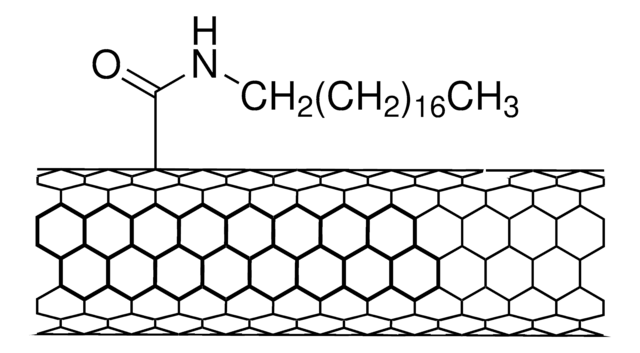724777
Carbon nanotube, single-walled
≥90% carbon basis (≥80% as carbon nanotubes), 1-2 nm diameter, avg. no. of layers, 1
Synonym(s):
CNT, SWCNT, SWNT, Single wall carbon nanotube
About This Item
Recommended Products
description
G/D Ratio: ≥15 (Raman 633 nm)
Median length: 1 μm
Quality Level
Assay
≥90% carbon basis (≥80% as carbon nanotubes)
form
powder (freeze-dried)
feature
avg. no. of layers 1
manufacturer/tradename
Signis® CG200
surface area
≥700 m2/g
impurities
≤5 wt. % Moisture
diameter
1-2 nm
mp
3652-3697 °C (lit.)
density
1.7-1.9 g/cm3 at 25 °C (lit.)
bulk density
0.1 g/cm3
SMILES string
[C]
Looking for similar products? Visit Product Comparison Guide
Related Categories
General description
Application
Preparation Note
Legal Information
Storage Class Code
11 - Combustible Solids
WGK
WGK 3
Flash Point(F)
Not applicable
Flash Point(C)
Not applicable
Certificates of Analysis (COA)
Search for Certificates of Analysis (COA) by entering the products Lot/Batch Number. Lot and Batch Numbers can be found on a product’s label following the words ‘Lot’ or ‘Batch’.
Already Own This Product?
Find documentation for the products that you have recently purchased in the Document Library.
Customers Also Viewed
pandemic influenza A H1N1 virus infectivity of
lung epithelial cells
Articles
The CoMoCAT® method of single-walled carbon nanotube (SWNT) synthesis yields high purity SWNTs with specific chiralities and narrow distributions of tube diameters.
The CoMoCAT® method of single-walled carbon nanotube (SWNT) synthesis yields high purity SWNTs with specific chiralities and narrow distributions of tube diameters.
The CoMoCAT® method of single-walled carbon nanotube (SWNT) synthesis yields high purity SWNTs with specific chiralities and narrow distributions of tube diameters.
The CoMoCAT® method of single-walled carbon nanotube (SWNT) synthesis yields high purity SWNTs with specific chiralities and narrow distributions of tube diameters.
Protocols
Surfactant-assisted dispersion of single-walled carbon nanotubes for debundling or exfoliation in dispersion procedures.
Surfactant-assisted dispersion of single-walled carbon nanotubes for debundling or exfoliation in dispersion procedures.
Our team of scientists has experience in all areas of research including Life Science, Material Science, Chemical Synthesis, Chromatography, Analytical and many others.
Contact Technical Service






